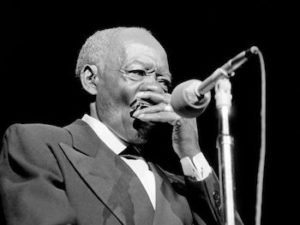
Deford Bailey Sr.
Deford Bailey was born on this date in 1899. He was a Black Country and Blues musician.
He was born in Bellwood, TN, and overcame polio early in his life. His back was deformed, and he never grew taller than four feet, ten inches. His mother died when he was a baby, and his father's sister and her husband raised him. Stricken with infantile paralysis at the age of three, the bedridden child was given a harmonica as a means of amusement. Bailey’s skill with the harmonica and musical talent earned him a reputation in the country music field.
Bailey's impressionable years were spent around the rural communities of Tennessee, near the railroad, where he composed many of his tunes on the harmonica. On the way to school, he had to go under a train trestle and said he would wait for the train to go over; then, "I would get under it, put my hands over my eyes, listen to the sound, and then play that sound to school." He was famous for recreating the sounds of rushing locomotives.
During his teenage years, Bailey worked for a white storekeeper in Thompson's Station and played the harmonica, to the delight of the customers and the proprietor. He remained with the storekeeper before joining his family in Nashville, where he held several jobs and continued to play the harmonica.
In 1925, Bailey won second place with his rendition of "It Ain't Gonna Rain No More" in a French harp contest on radio station WDAD. Then, he made his first appearance on WSM Radio after overcoming racial opposition from the station's director. From then on, he was given the title "Harmonica Wizard." Bailey played a role in naming the "Grand Ole Opry.”
In 1926, the WSM Barn Dance followed an hour of symphonic music. One evening, its programming concluded with a selection by a young composer from Iowa reproducing the sound of a train. Bailey opened the country music program with his rendition of "Pan American Blues.” The difference in the musical genres caused the director, George D. "Judge" Hay, to observe, "For the past hour, we have been listening to music taken largely from grand opera; from now on, we will present 'The Grand Ole Opry.'"
Bailey toured with other stars of the Opry, including Roy Acuff, Uncle Dave Macon, and Bill Monroe. During the 1930s, he was well received by the country music public, though racial segregation caused Bailey problems in hotels and restaurants. He sometimes posed as a baggage boy for the white performers to get a hotel room. In 1927, Bailey teamed with the Black Golden Echo Quartet to make his first recordings of "Pan American Express" and "Hesitation," but the Columbia recordings were never released. In 1928, he recorded Ice Water Blues/Davidson County Blues for Victor Records during a Nashville session that became so popular that the Victor label released it three times. Bailey's popularity peaked and waned within 15 years.
During the height of his popularity, he was allowed a 25-minute performance on the three-hour Opry show. By 1941, he was off the Opry and beginning a 30-year career of shining shoes at his shop on Twelfth Avenue, South. WSM dropped Bailey because of his limited repertoire and failure to convert to new tunes and written music. Bailey denied this, claiming the audience and the director insisted on hearing the old songs.
Bailey's career was remembered during the 20th-century American Civil Rights Movement of the 1960s. He appeared on a local syndicated blues television show, "Night Train," in 1965, he gave a concert at Vanderbilt University. He celebrated his 75th birthday by appearing in the new Grand Ole Opry House and playing several old tunes.
Deford Bailey died at the age of 82 on July 2, 1982. On June 23, 1983, the country music industry celebrated Bailey as the first Black star of the Grand Ole Opry.
The Encyclopedia Britannica, Fifteenth Edition.
Copyright 1996 Encyclopedia Britannica Inc.
ISBN 0-85229-633-0